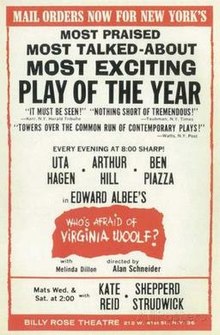“As for hobbies, people with stimulating hobbies suffer from the most noxious of despairs since they are tranquilized in their despair.”
Walker Percy, The Moviegoer
Terry Teachout on the arts in New York City
“As for hobbies, people with stimulating hobbies suffer from the most noxious of despairs since they are tranquilized in their despair.”
Walker Percy, The Moviegoer
Frederick Fennell leads the Tokyo-Kosei Wind Orchestra in an undated TV performance of John Philip Sousa’s “U.S. Field Artillery March”:
(This is the latest in a series of arts- and history-related videos that appear in this space each Monday, Wednesday, and Friday)
“In a strange way, I had fallen in love with my depression. I loved it because it was all I had. I thought depression was the part of my character that made me worthwhile. I thought so little of myself, felt that I had such scant offerings to give to the world, that the one thing that justified my existence at all was my pain.”
Elizabeth Wurtzel, Prozac Nation

In my Wall Street Journal drama column, I compare and contrast the original 1962 stage version and Mike Nichols’ 1966 screen adaptation of Who’s Afraid of Virginia Woolf? Here’s an excerpt.
* * *
When Hollywood filmed Broadway hits—something that it used to do as a matter of course—it was all too typically safe to assume that the quality of the screen version would vary in direct proportion to number of people involved in the adaptation who had also taken part in the original stage production. If the screenplay was knocked out by a studio veteran and none of the actors had previously played their roles onstage, you could almost always smell trouble.
That said, there have been certain glorious exceptions to this grim rule of thumb, among them Edward Albee’s “Who’s Afraid of Virginia Woolf?,” whose fourth Broadway revival was in previews when the coronavirus pandemic struck New York in March. On paper, Mike Nichols’ 1966 film version looked like a disaster in the making….

Yet against all odds, the film version of “Virginia Woolf” proved to be a wholly successful big-screen realization of Albee’s play….
Still, those lucky enough to see the Broadway production, which ran for a year and a half, unanimously regretted that the members of the original cast, directed by Alan Schneider, never got a chance to film their own distinctive performances. Fortunately for posterity, Columbia Records made a studio recording of the entire play four months after opening night. That four-LP set was reissued on CD in 2014 and can also be digitally downloaded. In addition, it has been uploaded to YouTube in its entirety.
To hear the original cast of “Virginia Woolf” is by no means to be disappointed in the extraordinary film version. Still, the performances of the stage cast are wholly absorbing in their own way….
* * *
Read the whole thing here.The original theatrical trailer for Who’s Afraid of Virginia Woolf?:
Louis Armstrong plays “Nobody Knows the Trouble I’ve Seen” (interpolating “The Star-Spangled Banner”) on The DuPont Show of the Month: Crescendo, originally telecast live by CBS on September 29, 1957:
To read more about the background of this important TV appearance, go here.(This is the latest in a series of arts- and history-related videos that appear in this space each Monday, Wednesday, and Friday)
“It is a trite yet urgently true observation that if America is to remain a first-class nation, it cannot have second-class citizens.”
Martin Luther King, Jr., address to the National Urban League (September 6, 1960)
“Depression is melancholy minus its charms—the animation, the fits.”
Susan Sontag, Illness as Metaphor
Lilli Palmer interviews Thornton Wilder in an extremely rare TV appearance on The Lilli Palmer Show. This clip was originally telecast on NBC in 1952:
(This is the latest in a series of arts- and history-related videos that appear in this space each Monday, Wednesday, and Friday)
An ArtsJournal Blog